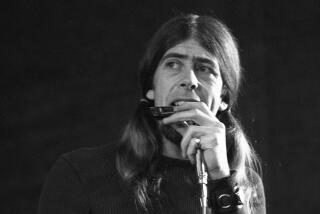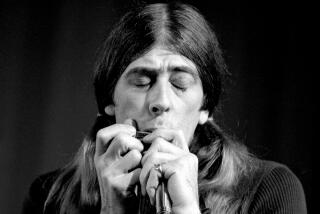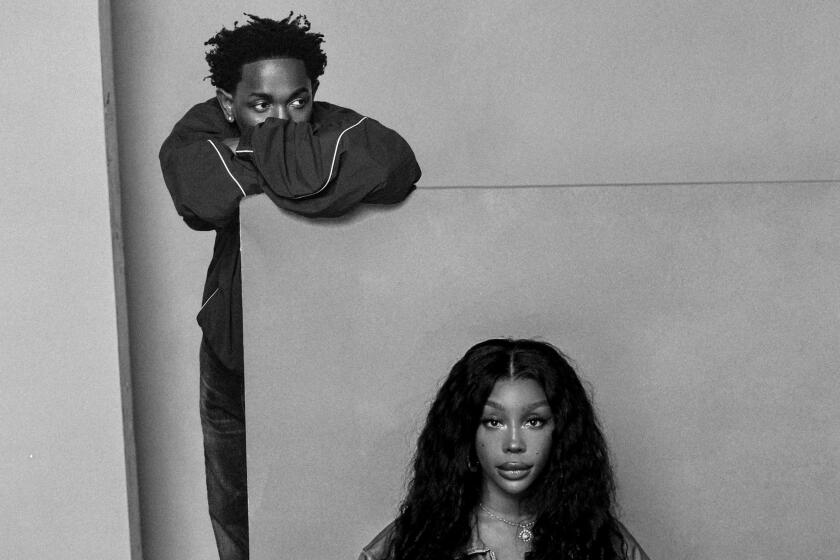Kenny Burrell’s 80th means a party for listeners
In the 1950s, three African American jazz guitarists emerged from the industrial Midwest, electrifying fans and showing very different paths forward on their instrument. By the mid-’60s, two of them were diminishing their gifts by venturing into slick, shallowly commercial settings. And thanks to heroin in one case and heart attacks in both, neither lived to see his late 40s.
Lovers of the blues guitar talk about their heroes selling their soul to the devil, but the jazz six-string has been nearly as dangerous.
The eldest member of that trio of jazz guitarists, Detroit native Kenny Burrell, is preparing to celebrate his 80th birthday with a concert at UCLA. His old peers Grant Green (who fell hard into drugs) and Wes Montgomery (who didn’t) made powerful records that continue to inspire and fascinate, but their peak years were brief. Burrell can look at six decades as an active jazz musician and massive influence running UCLA’s jazz program. Critic John Fordham had called his career “a long and graceful curve.”
When asked about his endurance, Burrell can’t quite explain his good fortune. But it’s clear that music itself — as well as strong genes and good habits — has kept him alive.
“I’m never satisfied,” Burrell, a low-key and gentlemanly presence, says in a back room at Royce Hall, where he will perform Saturday.
“I’m always trying to do something else. I just came out with my first solo guitar record. I can’t explain it, but I’m just really interested in the promise of tomorrow.”
Burrell, in fact, seems intimately connected to music’s possibilities. “Younger jazz players pride themselves on their skill in mimicking different styles or approaches,” Ted Gioia, author of “The History of Jazz,” says. “But Kenny Burrell embodies the jazz tradition. He is a master of the blues. He understands Ellington, bop, hard bop and cool at a very deep level. When I hear him, I feel as if the best of the music’s past is channeled effortlessly through his guitar.”
Young Kenny Burrell might have grown up to be a saxophone player if not for wartime austerity. “The guitar was actually the second choice,” he says, explaining that during World War II’s metal shortage, his mother could not afford the horn that, in the hands of Lester Young and Coleman Hawkins, had enchanted him.
So he bought a standard acoustic guitar for $10 at the suggestion of an older brother. When he heard, at about 12, the recordings of Charlie Christian — arguably the first great electric guitarist in any genre — Burrell was riveted. “He was playing it single-lined, like a horn — and with an amplifier!”
Soon after, he heard Nat “King” Cole guitarist Oscar Moore, who “brought another whole aspect to the guitar — chords and beautiful harmonies.” And the Belgian gypsy Django Reinhardt showed the young player “that you could get your own individuality on an instrument.” (Besides those three, he says, he’s been more influenced by horn players than other guitarists.) This was Detroit — the blues, like the Baptist Church, was all around him.
BREAK
While a student at Wayne State University, Burrell began recording with Dizzy Gillespie, and he soon emerged as an important sideman and leader in his own right. Elegant and effortlessly bluesy, he recorded, in the late ‘50s, several inspired sessions with John Coltrane; in 1963, Burrell cut “Midnight Blue,” a classic of the jazz guitar.
Burrell is still best known for his work of the ‘50s and ‘60s. But he’s made good records every decade, Gioia says, including a 75th birthday concert recorded in New York.
“Don’t underestimate the poise and self-confidence Burrell demonstrated during the fusion period and after,” he says, “serving as a champion for the jazz heritage even while his peers imitated the theatrics of rock. With his mastery of the guitar, Burrell would have been forgiven for watering down his music in exchange for a taste of rock auditorium fame, but he stayed true to his own core values.”
Part of what’s kept Burrell afloat over the years is musical focus. Music, he says, “has to be a balance between heart and mind. The thing is to not let your technique or your analytical side overshadow your feelings. There’s one more thing you’ve gotta do — you’ve got to be consistent. That takes work, it takes concentration, it takes focus, it takes dedication.”
He’s often praised for qualities like taste, discipline and aversion to musical cliché. “I sometimes think that phrasing is a lost art in jazz, and perhaps especially among guitarists,” Gioia says. “But Burrell knows how to shape a phrase, where to place the proper emphasis, how to construct a solo. He has unerring instincts — like a great boxer, who has a feel for the right move at the right moment.”
Burrell sees jazz soloing as a conversation between musician and listener. “If I was talking too fast, or not taking breaths, not giving you time to take it in — it would not get across very well.”
To him, the blues — which can lead lesser players to volubility — is about understatement. Music begins and ends with silence, he says. “In between, it’s up to you. You should make a statement. And when you’ve made your statement — which should be important to you, you should mean it — you should stop.”
The other thing that’s steadied Burrell, especially as jazz has begun to be shoved aside in the popular culture, is academia. In 1978, after decades based in New York, he began teaching at UCLA, launching a course called “Ellingtonia,” taking numerous views of Duke Ellington — as composer, bandleader, businessman, pianist and so on. In 1996, UCLA inaugurated a jazz studies program and he went from teaching one quarter a year to teaching full time. It was especially heartening as he remembers how shunned jazz had been at his alma mater.
At UCLA, Burrell teaches classes, oversees four jazz bands, organizes occasional public concerts and musicians’ gatherings, and assisted with the public programming for a Fowler Museum exhibit on jazz earlier this year. In the last few years he’s had a hand in a $30-million gift from musician Herb Alpert to endow a school of music and in the relocation of the Thelonious Monk Institute to UCLA from New Orleans — due next summer — which will allow the university to offer graduate jazz education.
As the guitarist marks eight decades and 60 years in jazz, Burrell doesn’t want to rest on his laurels. “Yeah, I’m 80,” he says, dropping his genial style. “But there’s got to be more to it than that.”
He hit a turning point a few years ago, when a friend told him, “You’re doing a great job with these kids — you’re training them for jobs that don’t exist.” Burrell had to concede that he was right. “So there are thousands and thousands of musicians who cannot get attention for their art.”
One root of the problem is that jazz has been crushed by the rock marketplace. But jazz, he says, belongs with other art forms. “If jazz was embraced by the classical world, it would have more staying power. Instead, it’s competing with all kinds of pop music.”
His latest project involves leading a new group, the Los Angeles Jazz Orchestra Unlimited, which will perform at his 80th birthday concert (other guests include B.B. King, Dee Dee Bridgewater and Lalo Schifrin). Burrell hopes this18-piece big band will become a rival of Wynton Marsalis’ Jazz at Lincoln Center Orchestra. “I want to make it so strong and so culturally important that it will catch on in other cities.”
He knows building a big band — finding talent and venues and financial support — isn’t easy. “My idea is to grow slowly,” Burrell says. “I’ve got time.”
More to Read
The biggest entertainment stories
Get our big stories about Hollywood, film, television, music, arts, culture and more right in your inbox as soon as they publish.
You may occasionally receive promotional content from the Los Angeles Times.










